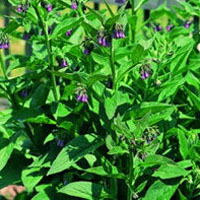Comfrey
 © Martin Wall
© Martin WallParts Used & Where Grown
The leaf and root of comfrey have been employed medicinally for centuries. Originally from Europe and western Asia, it is now also grown in North America.
- Reliable and relatively consistent scientific data showing a substantial health benefit.
- Contradictory, insufficient, or preliminary studies suggesting a health benefit or minimal health benefit.
- For an herb, supported by traditional use but minimal or no scientific evidence. For a supplement, little scientific support.
Our proprietary “Star-Rating” system was developed to help you easily understand the amount of scientific support behind each supplement in relation to a specific health condition. While there is no way to predict whether a vitamin, mineral, or herb will successfully treat or prevent associated health conditions, our unique ratings tell you how well these supplements are understood by the medical community, and whether studies have found them to be effective for other people.
For over a decade, our team has combed through thousands of research articles published in reputable journals. To help you make educated decisions, and to better understand controversial or confusing supplements, our medical experts have digested the science into these three easy-to-follow ratings. We hope this provides you with a helpful resource to make informed decisions towards your health and well-being.
This supplement has been used in connection with the following health conditions:
| Used for | Amount | Why |
|---|---|---|
Sprains and Strains | Apply an ointment containing 35% herbal extract | Comfrey is widely used in traditional medicine as a topical application to help heal wounds. |
Breast-Feeding Support | Refer to label instructions | as Comfrey Topical Comfrey is a soothing herb that can relieve sore nipples. Experts recommend moistening the herb with boiling water, wrapping it in gauze, and applying to the breasts.
|
Broken Bones | Refer to label instructions | as Comfrey Topical Comfrey has a long history of use as a topical agent for treating wounds, and was used by herbalists to promote more rapid repair of broken bones. |
Bruising | Refer to label instructions | Comfrey is widely used in traditional medicine as a topical application to help heal wounds and may be beneficial for bruises. |
Conjunctivitis and Blepharitis | Refer to label instructions | Comfrey has been traditionally used to treat eye inflammation. |
Cough | Refer to label instructions | Comfrey (the above-ground parts, not the roots) has a long history of use for relieving coughs. |
Peptic Ulcer | Refer to label instructions | Comfrey has history of traditional use for treating gastrointestinal problems, including stomach ulcers. |
Skin Ulcers | Refer to label instructions | as Comfrey Topical Comfrey has a long history of use as a topical agent for treating wounds, skin ulcers, thrombophlebitis, bruises, and sprains and strains. |
Wound Healing | Refer to label instructions | Comfrey has anti-inflammatory properties that may decrease bruising and help heal wounds when the herb is applied topically. |
Traditional Use (May Not Be Supported by Scientific Studies)
Comfrey has a long history of use as a topical agent for treating wounds, skin ulcers, thrombophlebitis, bruises, and sprains and strains.1, 2 Comfrey was used by herbalists to promote more rapid repair of broken bones, hence the common names boneset and knitbone. Topically, comfrey was also used to treat minor skin irritations and inflammation. It has also been used as a wash or topical application for eye irritations and for treating conjunctivitis. Internally, it was used to treat gastrointestinal problems, such as stomach ulcers, and lung problems.
Active constituents: Mucilage and allantoin are considered the major constituents in comfrey responsible for the herbs soothing and anti-inflammatory actions.3
Copyright © 2025 TraceGains, Inc. All rights reserved.
Learn more about TraceGains, the company.
The information presented by TraceGains is for informational purposes only. It is based on scientific studies (human, animal, or in vitro), clinical experience, or traditional usage as cited in each article. The results reported may not necessarily occur in all individuals. Self-treatment is not recommended for life-threatening conditions that require medical treatment under a doctor's care. For many of the conditions discussed, treatment with prescription or over the counter medication is also available. Consult your doctor, practitioner, and/or pharmacist for any health problem and before using any supplements or before making any changes in prescribed medications. Information expires December 2025.
